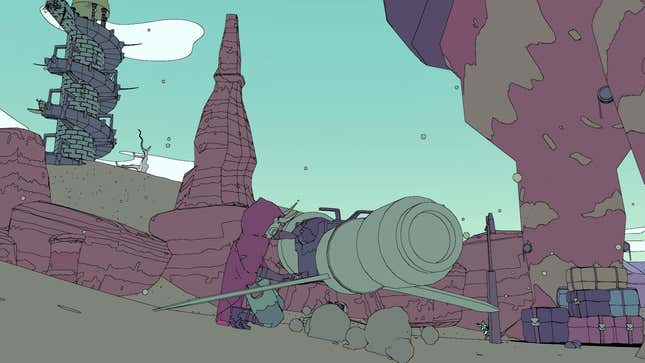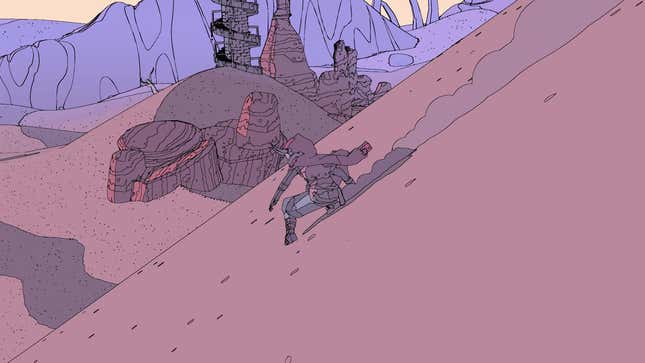When I meet the mask crafter for the first time, I am unsure if I am touching a spirit, god, or machine. The machinists, whose ranks I plan to join today, would probably dismiss the distinction altogether. As I remember this, my hoverbike Simoon purrs outside the tent. She has been a good teacher.
I absent-mindedly finger the tokens in my pocket—my hands are counting of their own volition: one merchant’s badge, two beetle badges, one cartographer’s badge, and three machinist’s. I am going to name myself one of these things today, at least for a while. Glider Sable will become Machinist Sable. I will touch Simoon and she will sing, and those who cannot see my face will still know my direction. Maybe this is what growing up is all about.
Sable, developed by Shedworks and published by Raw Fury, is a special game. The press and indie scene alike have treated it as such for a long time, and it’s no wonder why. Its visuals are breathtaking. Its atmosphere is impeccably crafted. The game’s soundtrack is by Japanese Breakfast for god’s sake. And it is designed in explicit conversation with the best games of the last decade, most notably Breath of the Wild. It was all but chemically engineered to be an indie darling. I am glad that it is both more, and less, than many people’s expectations.
Sable is a game about rites. Religious rites, rites of passage, social rites, the list goes on. Even the relationship between builder and machine becomes ritualized. Your titular character, Sable, is on her Gliding, which is a rite of passage that asks young people to choose the kind of person they would like to be. She is forming her own personal identity.
To do this, you journey across the land, meeting the people who inhabit this quiet and astoundingly beautiful planet. Each of these people wears a mask, telling you how they fit into their community. A machinist’s mask is smooth and practical. They are assembled from broken ship parts and adorned with function, and little else. The masks of innkeepers resemble beetles, wings flittering with anticipation when a potential new guest approaches. No one’s face is left uncovered, excluding the godlike doors in every temple.
These masked individuals give you little tasks, which you then accomplish. Sometimes you will climb massive structures, other times you’ll just go steal some beetle poop. Most tasks are small, and that’s fine. Sable is not about four-hour-long quest chains or sprawling dialogue trees. It’s about the feeling of the place: the sound of your hoverbike scraping the sands, the way that light catches and stumbles in a forest full of chalk, and sitting down, quietly, in front of a fire with someone you’ve never met before.

These moments make up the connective tissue of Sable, when you aren’t exploring your way through vast landscapes, abandoned cities, and broken ships. Sable’s world is filled with empty places for you to climb over and hoverbike through. This climbing feels basically identical to that in Breath of the Wild. You walk up to a wall, and you move in the direction of the thumbstick. Simple. The platforming is never too hard, nor are the game’s puzzles that challenging, but they really aren’t the star attraction here. That award goes to the aforementioned atmosphere, the best of which is exemplified by how great your hoverbike, Simoon, looks, sounds, and feels to ride.
Sadly, a wealth of really frustrating bugs can get in the way of this incredible vibe. I had a ton of menu issues. Shops would stop working. Using the pause menu would only bring up the graphics options. Character dialogue options wouldn’t appear. All of these things had to be fixed by restarting the game, which was especially hard because I didn’t want to pull myself away from the game’s gorgeous world.
Do I wish the game’s puzzles were, on average, more involved? Yes, I do. Do I wish that it was less buggy (I mean the menus, not the beetles, sadly)? Yes, I do. Do I think the game could do with a few more player verbs? Sure. But does any of this matter to me when I think about Sable hours after putting it down? No. It doesn’t.
All I can think about is masks in the desert, and the ways in which everything in this world feels in conversation with everything else. There’s this force in Sable called the Perpetual. The Perpetual connects all things and creates a gleaming, unified ontology. All things touch all other things, and that is what keeps us alive. It is as much a philosophy of being as it is the physical material which makes up the bubble protecting Sable every time she throws herself off of a cliff.
Everything about the game feels in line with the idea of objects built for one another. “Of course the world is not built for me,” you think. “These spires of rock were eroded by time and wind, they could not have considered me in their design.” But then you climb a structure in Sable, and you see the last sliver of your stamina bar slip away as you finish your climb. Another second and you would’ve fallen, but you didn’t. Instead, you’re standing, exhausted, looking out at the most beautiful vista you’ve ever seen, because you are part of the world, because this moment was built for you and you for it.
The climb was just long enough to challenge you, but not so long as to reject you altogether. It wants you to grow. Everything and everyone in Sable does, for that matter, which is why so many characters have quests for you. Do they need you to get something done? Sure, yes. But if they didn’t have something ready, they would probably find something for you to do. That’s what your Gliding is all about. You go out, see the world, and help people. You mess around until you find your place in things. And there is always a place for you. That is the Perpetual’s promise.
I have seen people call Sable’s world post-apocalyptic, and I can understand why. It has all the markers of the post-apocalypse: bleached bones, desert wastes interspersed with broken ships, and abandoned settlements. But I think this is a mischaracterization of Sable’s world. The ruins and temples you visit are not the product of some great tragedy, but the result of a nomadic culture that embraces and encourages real change.
The ruins you visit have not been abandoned because something happened, but because their function shifted. That you are in them at all implies something new about them. What was once a settlement is now a place to explore or a home for beetles. A crashed ship is not a ruined machine, but a living piece of your history which you can touch and learn from. It wants you to be there, and to gain something from the experience.
Sable’s world is not a broken machine, it’s doing fine. You’re not on some grand quest to save it, or return the planet to its former glory. You’re just a girl growing up in this place, and growing up means choosing a new mask.
There are a lot of video games about masks, and a lot of them are, similarly, about identity. In Persona 5, you tear off your mask to reveal your true self, manifested as a minor god or demon. In The Legend of Zelda: Majora’s Mask, your body warps when the mask meets your face. You scream and writhe as your bones contort to fill their new shapes. The mask is necessary, but violent.

This is often the way that neurodivergent people talk about fitting into society. You mask your true self, hiding it away to fit into a social system that was not built for you. The mask becomes prisonlike and destructive. Identity is a thing forced upon you, not a thing you choose.
Sable imagines something different, and gentler. It imagines masks as objects which communicate to other people who you are, and how you can help them. You can find the machinist in any city, or the cartographer in any bar. These identities are not the only part of the person, of course, but they do express how they relate to other people. And I think that, at its best, that’s what identity is all about.
I have seen other young queer people online talking about how there are hundreds of genders, and that gender is a deeply individual thing. I think this is, in some ways, true. Your personal expression will usually be unique to you, at least to some degree. However, I think there is a tendency to make gender synonymous with aesthetics and self-conception. It is a very “I think, therefore I am,” approach to identity, where the individual is centered above all else.
Sable’s masks present another option. Identity not as self-conception, but social function. You wear your machinist’s mask, and people come to you when they need a machinist. I perform the social function of lesbian, and that affects how people interact with me. Identity expresses a way of relating to other people, not just the way you see yourself.
In a nomadic culture that is deeply invested in change, you can shift your social function with time. Most people, after their Gliding, settle with one mask. They embrace that role for the rest of their lives. There is another option though: You can just do it again. Just like a town can become a ruin, which can then become a place for children to learn about their place in the world, so too can a child become a Machinist, who then becomes a Cartographer.
Sable imagines identity and growth as playful, joyous, and nearly impossible to fail. It promises you that changing your mind is okay. You wanted to be an Innkeeper, and now you don’t. It encourages you to become something else then, without rejecting or hating the person you’re leaving behind.
There are no deadnames in Sable. Just people and places who have become something new.
